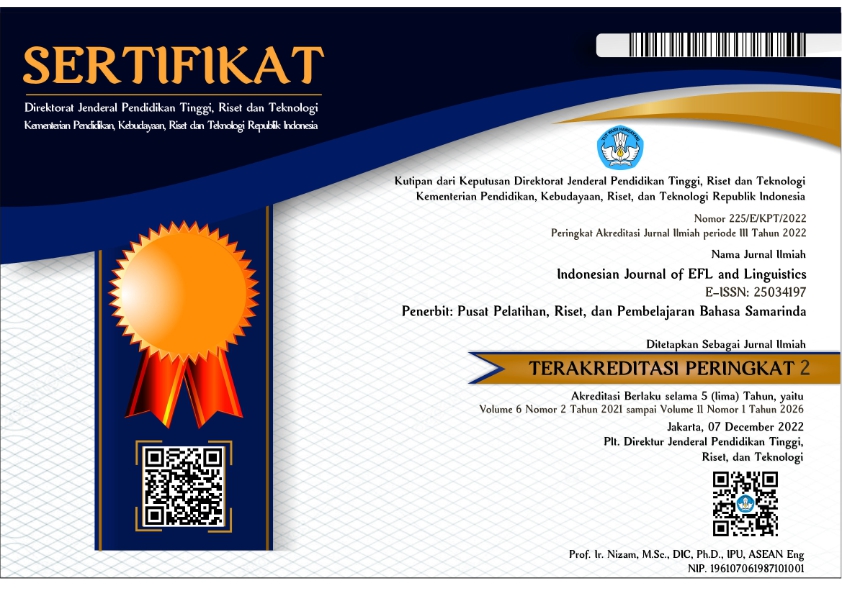Adjectives in Destination Promotion Texts
Abstract
As tourism texts act as an important source of information for prospective tourists, this paper looks into the use of adjectives in English tourism texts by analyzing a small, specialized corpus of texts promoting destinations. The self-compiled corpus had its data taken from the official tourism website of Vietnam. Using TermoStat Web 3.0 (Drouin, 2003) and Antconc (Anthony, 2011) to identify adjectives in the corpus, the study seeks to explore adjectival usage in a discourse which is known for its hyperbolic language and offers a better understanding of ways adjectives help create persuasive texts. Results revealed a high percentage of adjectives in the analyzed texts. Besides, the extensive use and high selectivity of adjectives in the corpus help paint a complete picture of the destinations being described, hence connect those places with the reader. Notably, compound adjectives were found to be widely utilized for compact but detailed expressions. The findings are beneficial to instructors and learners of English for tourism and English writing as well as translation training and practice.
References
Biber, D., Johansson, S., Leech, G., Conrad, S., Finegan, E., & Quirk, R. (1999). Longman grammar of spoken and written English (Vol. 2). London: Longman.
Cappelli, G. (2006). Sun, Sea, Sex and the Unspoilt Countryside: How the English language makes tourists out of readers. Pari Publishing.
Cappelli, G. (2007). The translation of tourism-related websites and localization: problems and perspectives. Rassegna italiana di linguistica applicata, 39(1/2), 97.
Caruso, A. & Ruffolo I. (2014). ESP self-compiled corpora in an Italian academic setting. In G. Budin & V. Lušicky (eds.), Languages for Special Purposes in a Multilingual, Transcultural World, Proceedings of the 19th European Symposium on Languages for Special Purposes, 8-10 July 2013, Vienna, Austria. Vienna: University of Vienna, 340-351.
Conti, S. (2006). Compound Adjectives in English. A descriptive approach to their morphology and functions [Doctoral Dissertation, University of Pisa].
Dann, G. M. (1996). The language of tourism: a sociolinguistic perspective. Wallingford: CAB International.
Dehham, S. H. (2014). The performance of Iraqi EFL university learners in using English compound adjectives. Journal of University of Babylon, 22(2), 349-372.
Drouin, P. (2003). Term extraction using non-technical corpora as a point of leverage. Terminology, 9(1), 99-115.
Edo-Marzá, N. (2011). A comprehensive corpus-based study of the use of evaluative adjectives in promotional hotel websites. Odisea, 12, 97-123.
Francesconi, S. (2014). Reading tourism texts: A multimodal analysis. In Reading Tourism Texts: A Multimodal Analysis. Channel View Publications. https://doi.org/10.1016/j.annals.2014.11.007
Frank, T. O. (2021). Neonym Analysis in the English Language for Tourism Purposes. Journal of Teaching English for Specific and Academic Purposes, 187-200.
Kang, N., & Yu, Q. (2011). Corpus-based Stylistic Analysis of Tourism English. Journal of Language Teaching and Research, 2(1), 129–136. https://doi.org/10.4304/jltr.2.1.129-136
Kiss, I. (2018). The persuasive discourse function in the language of tourism. Argumentum, 14, 150-162.
Luo, J., & Huang, T. Y. (2015). Genre-based analysis of American tourism brochure. Open Journal of Social Sciences, 3, 200-208.
Maci, S. M. (2007). Virtual Touring: The Web-Language Of Tourism. Linguistica e Filologia, 25, 41–65. https://doi.org/10.6092/LeF_25_p41
Malenkina, N., & Ivanov, S. (2018). A linguistic analysis of the official tourism websites of the seventeen Spanish Autonomous Communities. Journal of Destination Marketing & Management, 9, 204-233.
Manca, E. (2016). Persuasion in tourism discourse: Methodologies and models. Cambridge Scholars Publishing.
Mansor, I., & Salman, G. (2016). Arabic for Tourism: Guidelines for Linguists and Translators. Arab World English Journal (AWEJ), 7(3), 77-74.
Merkaj, L. (2013). Tourist Communication: a Specialized Discourse With Difficulties in Translation. European Scientific Journal, 2(December), 1857–7881.
M.Nordin, N. R., Stapa, S. H., & Darus, S. (2013). Developing a specialized vocabulary word list in a composition culinary course through lecture notes. Advances in Language and Literary Studies, 4(1), 78-88.
Muñoz, I. D. (2011). Tourist translations as a mediation tool: misunderstandings and difficulties. Cadernos de tradução, 1(27), 29-49.
Muñoz, I. D. (2012). Analysing common mistakes in translations of tourist texts (Spanish, English and German). Onomazein, (26), 335-349.
Muñoz, I. D. (2019). Adjectives and their keyness: a corpus-based analysis of tourism discourse in English. Corpora, 14(3), 351-378.
Ngula, R. S. (2018). Corpus methods in language studies. Perspectives on Conducting and Reporting Research in the Humanities, 205-223.
Nigro, M. G. (2006). The language of tourism as LSP? A corpus-based study of the discourse of guidebooks. Modern Approaches to Terminological Theories and Applications. Bern: Peter Lang AG, 187-198.
Pierini, P. (2009). Adjectives in tourism English on the web: a corpus-based study. CÃRCULO de LingüÃstica Aplicada a la Comunicación, 40, 93-116.
Pierini, P. (2015). Translating English compound adjectives into Italian: problems and strategies. Translation & Interpreting, 7(2), 17-29.
Salim, M. A. Bin, Ibrahim, N. A. B., & Hassan, H. (2012). Language for Tourism: A Review of Literature. Procedia - Social and Behavioral Sciences, 66, 136–143. https://doi.org/10.1016/j.sbspro.2012.11.255
Salim, M. A. M., Ibrahim, N. A., & Hassan, H. (2014). Promoting diversity via linguistic and visual resources: An analysis of the Malaysian tourism website. LSP International, 1, 1-14.
Sari, N. L. R. T. A. (2018). English Compound Adjective with Special Reference to Tourism Website. Humanis, 22(2), 374-381.
Skibitska, O. (2013). The Translation of Tourism Websites. In FLLT Conference Proceedings by LITU (Vol. 2, No. 1, pp. 735-740).
Stein, D. (2006). The website as a domain-specific genre. Language@Internet, 3, article 6. http://www.languageatinternet.org/articles/2006/374
Yamazaki, S. (2002). Distribution of Frequent Adjectives in the Wellington Corpus of Written New Zealand English. In English Corpus Linguistics in Japan, 63-75. Rodopi.
Yifeng, S., & Fang, T. (2014). A Parallel Corpus-based Investigation of Vocabulary Features of Tourism Translations 1. International Journal of Linguistics, 2(3), 1–22. https://doi.org/10.15640/ijlc.v2n3a1




